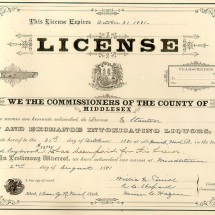The number of liquor licenses in Boston is limited by law and tied to the City of Boston’s population. Currently, there are approximately 1,030 total alcoholic beverage licenses issued to restaurants and bars in the City of Boston, and that includes hotels and entertainment venues such as Fenway Park or anywhere that alcoholic beverages are sold. Of the 1,030 total alcoholic beverage licenses issued, approximately 675 of those are so-called “All Alcoholic Beverage” licenses and 335 are for just the sale of Beer & Wine. While the number of liquor licenses is limited, the demand for such licenses remains great as Boston’s economy still fairs better than most cities in the United States, and any new hotel, bar or restaurant wanting to open in Boston increases demand for these scarce licenses.
Since the City of Boston has no more licenses to issue, new business ventures must purchase an existing license from an existing establishment. Licenses can be bought and transferred from one location to another within the City of Boston, but not from outside the City. Should an existing establishment sell its license, it generally means the establish will close and go out of business. For this reason, the number of “willing” sellers in this market is generally limited to failing businesses, businesses that cannot renew a lease or businesses wherein the owners simply want to cash-out of their investment.
To complicate matters even further, some neighborhood associations, which carry significant influence over City Councilors and the Boston Licensing Board, informally impose a limit or cap to the number of licenses that are allowed within that neighborhood, creating even greater pressure on the supply of licenses within those neighborhoods. The Back Bay’s neighborhood association, for example, has been largely successful in limiting the number of licensed establishments within that part of Boston to about 116, and the North End’s neighborhood association has successfully limited its number of total licenses to about 93.
Consequently, the market for liquor licenses can be better understood when broken into local neighborhood markets, each local neighborhood market dictating a price depending on the local supply and demand for licenses. Potential new businesses for these neighborhoods should therefore purchase a license from an existing business within those neighborhoods, to insure smooth sailing at the transfer hearing before the License Board.

